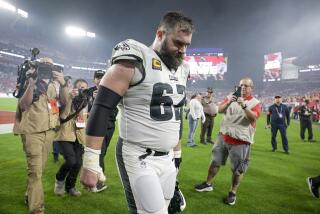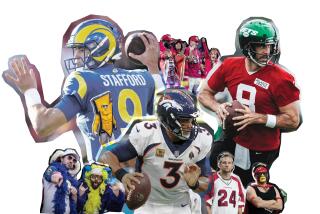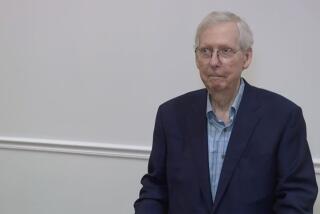MORNING BRIEFING
- Share via
It must be a strange sensation for Donovan McNabb to be treated as a knee-creaking old man at the age of 32. In another profession, like medicine, he would just be getting started. But he didn’t choose to be a doctor; he chose to be a mythic figure, that’s his real line of work. As an NFL quarterback he’s not only supposed to win games, but be a symbol of youthful perfection, which is why it so irritates fans when he shows signs of aging. Guy didn’t do his job.
This week, McNabb had to seriously entertain questions about whether his performance has declined due to his advancing years. His prompt and emphatic answer was that if anything, he is getting better: “Fine like wine, baby,” he said, smiling. But after the amusement dissipated the suggestion lingered that McNabb has turned some indefinable corner in his career as the Philadelphia Eagles quarterback, that because it’s been three years since his last appearance in the NFC championship game, his talent is brittle as bones and he will soon be in a bed of pain and rushing toward ultimate termination.
It seems like we’re always prematurely kicking dirt over the careers of athletes. The moment they move one click past their absolute prime, we start suggesting they are less than they used be and shoving them toward retirement. In fact, the physiological evidence suggests that we chronically overstate the effects of aging on athletes, with no basis for our assumptions except, frankly, anxiety.
If McNabb isn’t the quicksilver mover he was in leading the Eagles to four straight conference title games from 2001 to 2004, he’s still formidable enough to amass a career high in yardage. And as McNabb pointed out, on Sunday he will face Kurt Warner, who at age 37 has thrown for almost 5,000 yards. Last season, Vinny Testaverde was a starting quarterback at age 44.
“I think the cop-out at times is people saying, ‘He’s getting too old,’ or, ‘He’s not able to do the things he was able to do back five years ago,’ ” McNabb said in his news conference last week. “None of us can do the things we did five years ago, including you guys. Some of you are writing slower than you did five years ago. The stuff you talk about in the paper just doesn’t make sense. Some of you are dressing kind of funny. But you know what? That’s just something that people can just cling on to and everyone goes with it. . . . It’s really in the position that you’re in. Given the opportunity, some guys flourish and some guys don’t. Thirty-two years old is really not old, that’s almost at the prime of your career.”
McNabb is not rationalizing. There happens to be a mathematical basis for what he says. In 2007, two Middlebury College economics scholars, Paul Sommers and Stefan Hrdina, performed a study called “When Do NFL Quarterbacks Pass Their Prime?” They asked, “If 22 is ‘too young’ and 38 is ‘too old,’ at what age do quarterbacks peak?” and devised a mathematical formula that took into account age, passer ratings and regressions. They applied it to two seasons of starting quarterbacks, 1995 and 2005. They concluded, “the prime age for NFL quarterbacks is remarkably stable at about 31 years of age.”
What exactly happens to a man McNabb’s age? The answer is, not much. According to gerontologists, some slight physical decline in aerobic capacity and muscle mass begins in all of us beginning around age 25. But at the elite level these changes are “relatively meaningless,” according to Steven A. Hawkins, a gerontologist and professor of kinesiology at Cal State Los Angeles.
A potentially more significant change begins to occur in the nervous system. “The nerves that enervate our fast muscle fibers seem to be targeted for loss,” Hawkins says. What that means is you may respond an instant slower. But that’s not necessarily a bad thing if it means a gain in composure. “One of the tradeoffs is, where you may lose a little physical ability, what you gain from an emotional and mental perspective overrides it,” Hawkins says. “Clearly they [older athletes] have a better perspective. They’re calmer.”
The lesson that athletes often gain in maturity what they may lose in physical responses isn’t new. But for some reason, we consistently fail as spectators to apply it. McNabb has been facing questions about his future for almost three years now, as the Eagles have struggled through seasons of 6-10, 8-8 and a 5-5-1 start this season, and McNabb has fought to recover his mobility since he tore a knee ligament in 2006.
Sports Illustrated writer Tim Layden admits that when he watched McNabb rehabbing in the spring of 2007, he believed McNabb was “toast.” During this preseason, Tom Curran of NBCSports.com wrote a long analysis suggesting that McNabb could be at a crossroads -- even as McNabb declared he felt healthier than in some time.
“I think you’re too early on that because he’s going to prove you wrong,” Eagles right tackle Jon Runyan told Curran. “That’s the type of guy he is. He doesn’t want anybody telling him he’s done. He’ll tell you when he’s done.”
In retrospect the chatter that McNabb might be done as an Eagle was absurd. It reached a dramatic climax at midseason when McNabb gave up five turnovers in two games, and Coach Andy Reid briefly benched him, and you wonder how much it affected Reid’s thinking. The constant drumbeat about age not only did a disservice to a player of deep ambition like McNabb, it robbed us of some useful perspective about the real effects and how they apply to all of us.
The truth is, age is a lot less relevant than we make it, and the way McNabb defies it the more important observation. Mainly, our fixation on it says more about our insistent need to see athletes in their purely beautiful “prime” than it does about McNabb, who apparently is not allowed to have a couple of bad games, or to be distracted by the imminent birth of twins, without being labeled past-it. As it turned out, McNabb set a career-high with 3,916 yards passing and led the Eagles to a franchise-record 416 points.
Which he greatly enjoyed pointing out when the subject came up this week.
“Some of you guys sitting in here wish you were 32,” McNabb said. “I’ll tell you about it. It’s fun.”
More to Read
Go beyond the scoreboard
Get the latest on L.A.'s teams in the daily Sports Report newsletter.
You may occasionally receive promotional content from the Los Angeles Times.










